Interreligiöses Rawald-Festival / 25.6. - 26.6.2019
Unser Interreligiöses Rawald-Festival vom 25. -26. Juni 2019
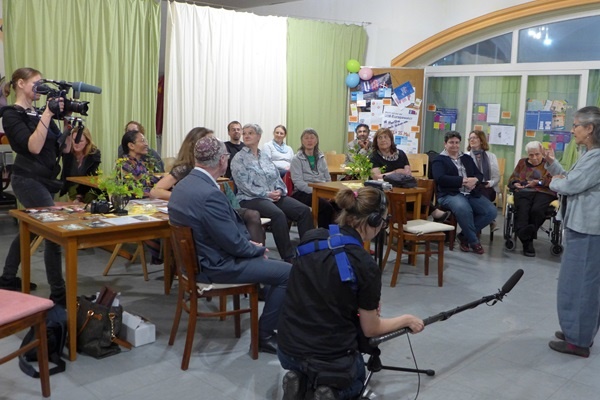
Gudrun Rawald z "l from Rotterdam/Netherlands was a mentsh with a big heart, visions and the necessary energy to make them come true. She has travelled extensively, lived and worked in Indonesia for 10 years and raised 5 children with her husband, 4 of them adopted. She approached people and did what she could to bring a little more light into our world. Judaism and its history as well as the overcoming of alienation, discord and violence between the 3 major monotheistic world religions were of particular concern to her. She stipulated in her will that after her death a common celebration of the three great religions should take place in her name in Berlin under the leadership of a Jewish community or group. Chasan Jalda Rebling and her community Ohel Hachidusch were entrusted with the legacy of Rabbi Albert Ringer from Rotterdam. During the preparation it soon became clear that in the spirit of Gudrun Rawald we would organize an inter-religious festival, where walls would crumble a little and people of the three monotheistic religions would meet and celebrate together at eye level.
Wir mussten nicht lange überlegen: unsere Partner wurden langjährige Freunde, mit denen wir auch schon früher erfolgreich zusammen gearbeitet hatten: die ev. St. Martha-Gemeinde in Kreuzberg, (http://www.martha-gemeinde.de/), Ars Choralis Coeln unter Leitung von Maria Jonas (https://www.ars-choralis-coeln.de/), Bassem Hawar, Musiker aus Bagdad / Köln (www.bassemhawar.com/ ) und Zahra Samadi von der 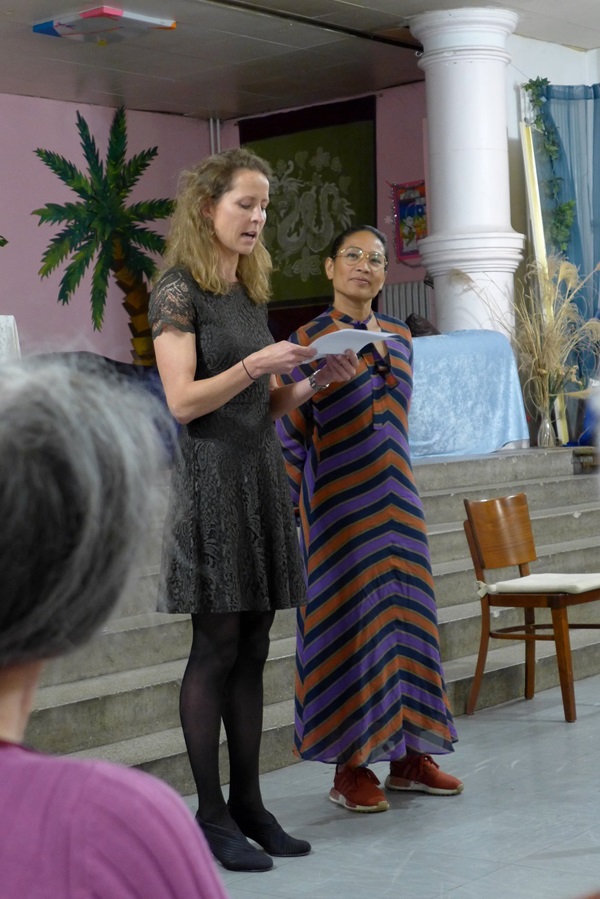 Fachhochschule für Technik, Berlin. Die Martha-Gemeinde stellte auch grosszügig die Räume für unser gemeinsames Fest zur Verfügung und bewies sich mal wieder als grossherzige Gastgeberin. Wir fühlten uns in der liebevollen Atmosphäre gleich zu Hause. Ein grosses Danke-schön geht an Els van Vemde und Pfarrerin Monika Matthias.
Fachhochschule für Technik, Berlin. Die Martha-Gemeinde stellte auch grosszügig die Räume für unser gemeinsames Fest zur Verfügung und bewies sich mal wieder als grossherzige Gastgeberin. Wir fühlten uns in der liebevollen Atmosphäre gleich zu Hause. Ein grosses Danke-schön geht an Els van Vemde und Pfarrerin Monika Matthias.
Besonders gerührt und erfreut waren wir, dass sich 2 der Töchter von Gudrun Rawald, -Ruth und Monique,- sowie Rabbi Albert bereit erklärt hatten, an unserem Fest aktiv teilzunehmen und ihre Erinnerungen mit uns zu teilen. So bekam Gudrun ein ganz persönliches Gesicht und war uns sehr nah. Sie war dabei. Dieses Gefühl wurde dadurch verstärkt, dass Ruth und Monique Fotos von ihrer Mutter mitgebracht hatten und Ruth ihre Mutter in ihrer sehr anrührenden Rede auch persönlich ansprach. Wir hatten viele Fragen an Ruth und Monique, die sie auch offen und bereitwillig beantworteten, so dass schon bei den Willkommensgesprächen am Samstagabend schnell eine Atmosphäre der Vertrautheit entstand. Diese Atmosphäre wurde noch durch die sehr persönlichen Begrüssungsreden und mit Musik unterstrichen. Jalda und Bassem improvisierten einige Strophen aus dem Hohelied Salomos. Jaldas Stimme und Bassems Dhoze zauberten Jahrhunderte alte Klänge und Bilder aus der Wüste in den Saal. Die Dhoze ist ein orientalisches Saiteninstrument mit langem Hals und rundem Resonanzkörper. Bassem baut alle seine Instrumente übrigens selber.
Time passed quickly and at the following Se'uda shlishit, the third meal on Shabbat, we were really hungry. After the Ohel typical kiddush the food tasted delicious and we thank all who contributed to it. It got dark quickly and under Jalda's guidance our community of the 3 big monotheistic religions together said goodbye to the Shabbat.
The next day, Sunday, we celebrated the whole day. It began with an inter-religious service in which all 3 religions spoke with texts and singing. Many regular worshipers of the Martha congregation prayed together with us. They too were quickly drawn into the spell of the common experience. Ars Choralis Coeln under the direction of Maria Jonas, Bassem Hawar, Zahra Samadi and Chasan Jalda sang and played music together to the glory of the one God and in memory of Gudrun Rawald z''l until the church vibrated and the angel with the broken wing, a symbol of the Martha community, certainly also felt a surge of strength.
Afterwards, over coffee and cookies, there was an opportunity for further discussions and to get to know some members of St. Martha's parish better, who then stayed until the end of our celebration. They felt comfortable and addressed, a nice confirmation for our celebration.
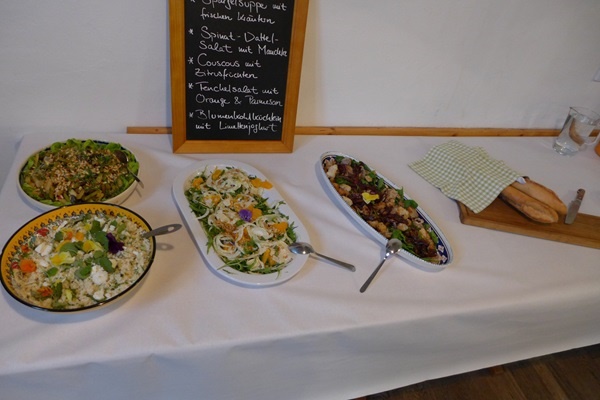
For lunch we enjoyed an excellent vegetarian buffet, for which we thank the catering service "Cathrin kocht" very much. Since the weather was fine, most of us ate in the beautiful, relaxing garden of the Martha community. Again, many interesting conversations started and before we knew it, there was time for the next item on the program:
Kein Fest ohne Lernen. So begannen wir gestärkt unsere Mittagsrunde, in der uns Rabbi Albert spielerisch vermittelte, wie wichtig Gemeinschaft ist. Es folgten Berichte von Els van Vemde und Monika Matthias über die schon Jahrzehnte andauernde Integrationsarbeit der Martha Gemeinde, in der 1978 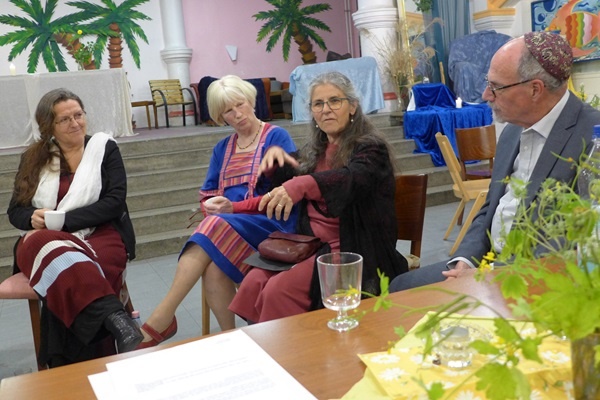 das erste emanzipatorische Frauencafé der Berliner Kirchenlandschaft gegründet wurde. Dieses Café wurde später in das Mira Martha Projekt, in dem sich viele, überwiegend frauenspezifische Initiativen bündelten, eingegliedert.
das erste emanzipatorische Frauencafé der Berliner Kirchenlandschaft gegründet wurde. Dieses Café wurde später in das Mira Martha Projekt, in dem sich viele, überwiegend frauenspezifische Initiativen bündelten, eingegliedert.
.
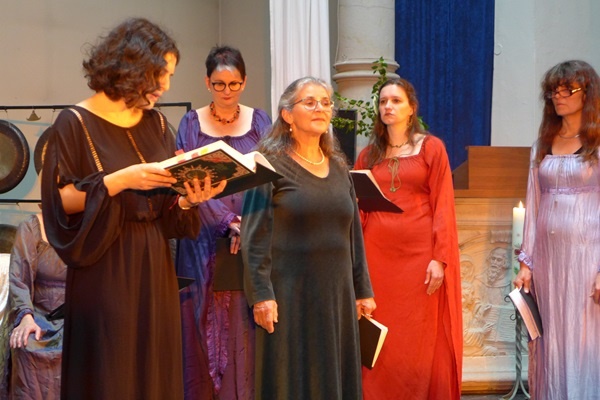
After a short coffee break, the day ended with a concert of Lailah voices at night, also a project that was born out of the visions of individuals: Jalda Rebling had the idea and Jalda, Maria Jonas and Maryam Amer implemented and developed it together until Lailah became as we were able to experience her on Sunday evening. LAILAH defines itself as an intercultural-religious project that musically crosses the borders between the three religions Judaism Christianity and Islam to return to its origins. We discover common ground without abandoning the diversity of the paths. The musical dialogue or trialogue is at the centre. What we can all share is our musical roots, which can be traced back to common modal origins. Here we begin our journey of discovery.
It really became a journey of discovery. The originally Jewish T'hillim are the psalms of the Christian tradition. In the Koran there are many quotations from the T'hillim. All our music has its origin in the Mesopotamia. In the hall there was a spellbound silence. A deep devotion that touched the heart. The voices partly sounded like calls from another world, simply heavenly. And the instruments -Dhoze, tamburellos, bells, harp and shrutibox- fitted in harmoniously. It was a musical monotheistic multifaceted harmony.
Gudrun Rawald z`` l set a stone rolling with her legacy. We were able to give him a push with our inter-religious celebration, which clarified and strengthened our common roots. Gudrun has fulfilled a dream that will continue to grow. The motto of the Martha congregation on her website is a thought of Nelly Sachs z'' l , which also fits to our Rawald festival:
Everything begins with longing. There is always room for more...
Etha Jimenez, 03.06.2019
Schawuot 5779 / 9.6.19 / 6. Siwan 5779
Pessach 5779 / 20.4.19 / Erew 16. Nissan 5779
Sukkot 5779 / 23.09.2018 / 15. Tischri 5779
IIIIIIIIHHHHHHHHHH - was that a succot! We met at about 3 pm in Gatow on the shed - the sky became darker and darker... and then, as we started to anchor the first wooden struts, the rain started - at first hesitantly and leisurely, then persevering and yielding.
The Ntaur, the plants, the earth must have been incredibly happy about this, but we tried to protect ourselves and, with the help of many hands and the speed of a prefabricated house builder, we built a beautiful autumnal Sukka.
Afterwards, while eating a nice meal despite the wetness, other Ohelistas and their families joined us.
Taschlich 5779 / 10.09. 2018 / Erew 2.Tischri 5779
On the 1st day Rosh haShana the Ohelistas met with their friends at Gatow Manor.
Under the guidance of our chairman Anna Adam we welcomed the new year 5779 and made Taschlich an der Havel.
As is tradition at Ohel-Hachidusch, we wrote the things that had accompanied us last year and which we are now trying to do without, on ecologically sound ,water-soluble paper. We put these letters into small boats made of the same material. We decorated these boats with flowers, blossoms and grasses.
At the beginning of the Taschlich ceremony on the Havel, Uli played the Hatikwa on his clarinet. Then we gently handed over our boats to the Havel.
Accompanied by beautiful melodies and our hope that only our positive dreams will come true, our boats slowly moved away from us.
At the end the sounds of the Schoffar sounded, which was skilfully blown by Anna.
For a kiddush with honey and apples and a rich buffet we went back to the manor. Here we let the day end in a comfortable round and wished each other a sweet new year.
Many thanks to Rita and Uli that we could experience this time with them.
